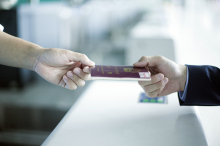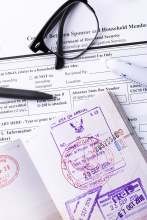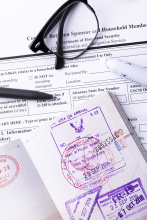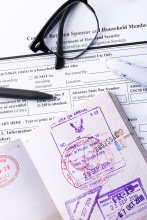摘要:
移民局在本周一公布了关于限制持有旅游,商务签证这在美的滞留时间缩短为30天的规定.申请延期将会加难,并需要提供有特别紧急原因(如发的疾病等)而需要延期的证明.能延长的时间也将由一年改成6个月.
即时生效,除非持有F-1签证的学生,持其他签证者均不能在美国院校注册上学.如持其它签证者进入美国后想转换学生签证,该人必须回本国重新签证.INS保证在30天之内给与回复.
30天内公众可以就这项提议发表意见.
NS puts new restrictions on visiting students, business travelers
Sept. 11 hijackers studied flying without student visas
April 8, 2002 Posted: 9:21 PM EDT (0121 GMT)
http://www.cnn.com/2002/US/04/...changes.ap/index.html
-------------------------------------------------------------------------------
WASHINGTON (AP) -- Immigration officials tightened visa rules for foreign students Monday and proposed a 30-day limit to the time millions of tourists and business people may stay in the country.
Effective immediately, a foreigner wishing to study in America must obtain a student visa before beginning classes. Previously, a student could request a visa and begin coursework while his or her application was processed.
The Immigration and Naturalization Service believes requiring approval before students enroll will ensure they have received appropriate security checks before entering the country.
The INS also is proposing that people who want to switch from a tourist or business visa to a student visa return to their home country to apply. A person now can switch while in America. In return, the INS says it would speed up decisions on such requests, issuing them within 30 days.
Two of the September 11 hijackers, Mohammed Atta of Egypt and Marwan Al-Shehhi of the United Arab Emirates, came to the United States on visitor visas and later applied for student visas. They began training at a Florida flight school in July 2000, more than a year before the INS approved their student visas.
At the time of the attacks, approximately 600,000 foreign students were enrolled in U.S. colleges and universities. INS officials acknowledged they could not verify the whereabouts of many and promised changes to better track them.
Extensions harder to get
The INS also is proposing to reduce from six months to 30 days the time a business traveler or tourist may stay in America. And the agency will make it more difficult to extend a stay.
Visitors would have to show unexpected or compelling reasons for an extension, such as the need for medical treatment or a delay in completing a business matter, according to an INS official who did not want to be identified. The maximum length of a visa extension would be reduced from one year to six months.
The changes could have a huge impact on the many thousands of people who spend more than a month visiting family in America. Also affected would be young people and retirees from foreign lands who come to the United States each year and for months of sightseeing.
The INS official said those people would have to return home after a month and reapply for a visa. [page]
Travel industry officials said the proposal could hurt tourism, which still is recovering from the attacks.
"Any time we make it more difficult -- erect barriers or tighten barriers -- for people to come into our country, we give them incentive to go someplace else, and we've seen that," said Elise Wander of the Travel Industry Association of America.
Dexter Koehl, an association spokesman, said the travel industry favors having INS do more thorough checks before issuing visas and at points of entry rather than reducing the time visitors may stay.
The INS says about 10 million people received tourist visas in 2000, the latest year with available data, and three-quarters of them stayed less than a month. Another 2.5 million traveled to America on business and stayed an average 13 days.
"These new rules strike the appropriate balance between INS' mission to ensure that our nation's immigration laws are followed and stop illegal immigration and our desire to welcome legitimate visitors to the United States," INS Commissioner James Ziglar said.
Under another proposed rule, INS wants to require people who get final deportation orders to surrender themselves within 30 days. Those who don't will be denied any chance to appeal or seek asylum.
Currently, about 90 percent of non-detained individuals who receive final deportation orders fail to surrender, according to the INS. Those who do often appeal or seek asylum.
The proposed rules are open to public comment for 30 days.








